一轮总复习 状语从句课件
图片预览

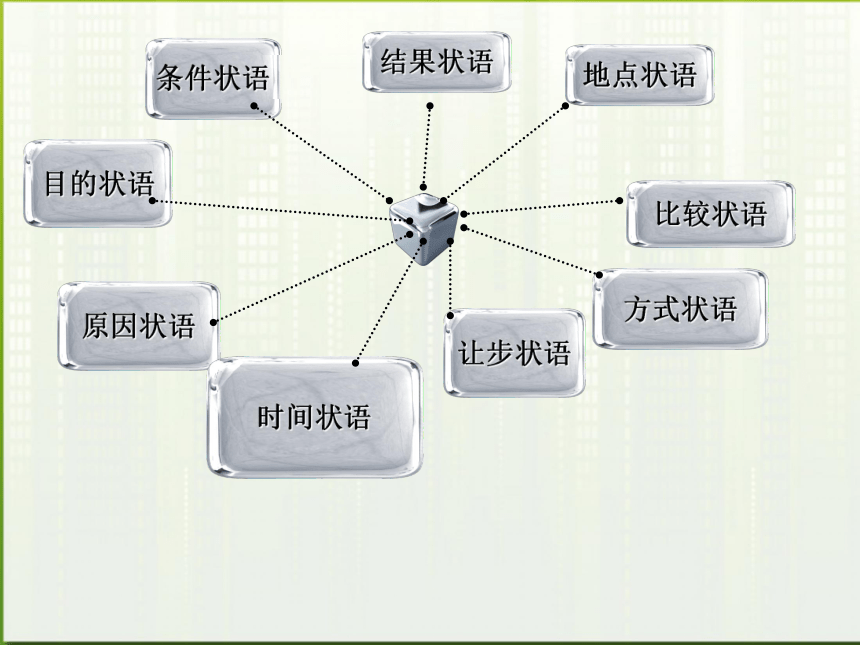
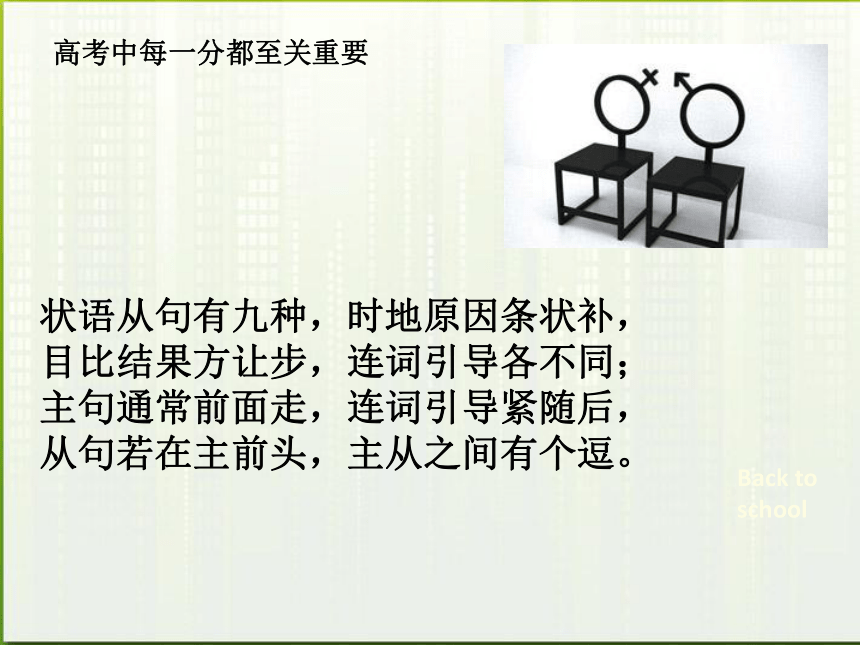
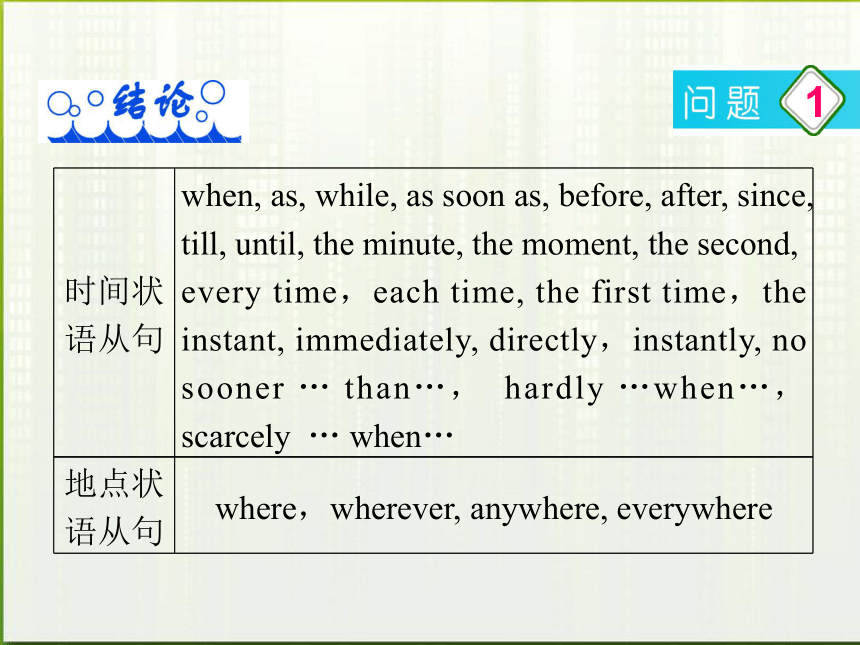
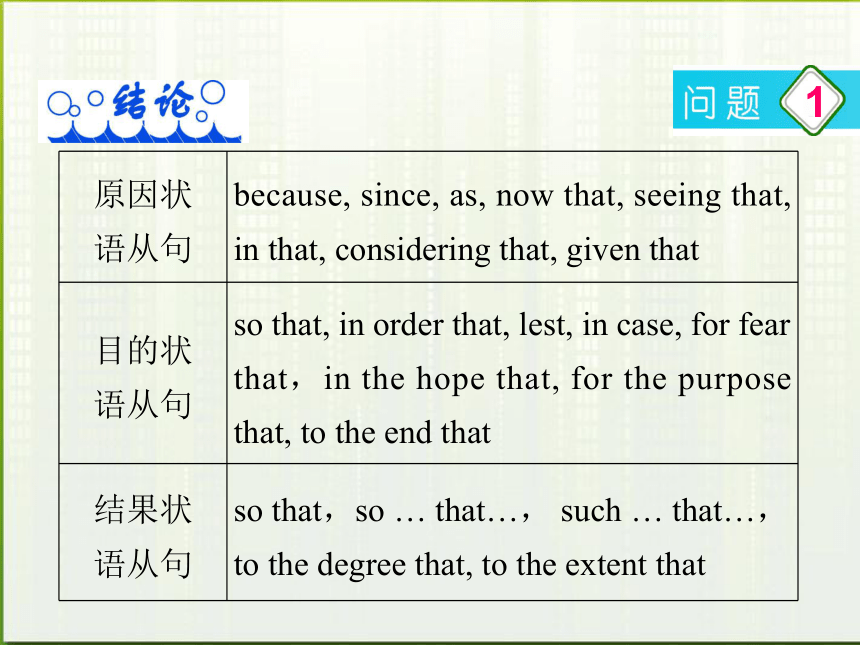
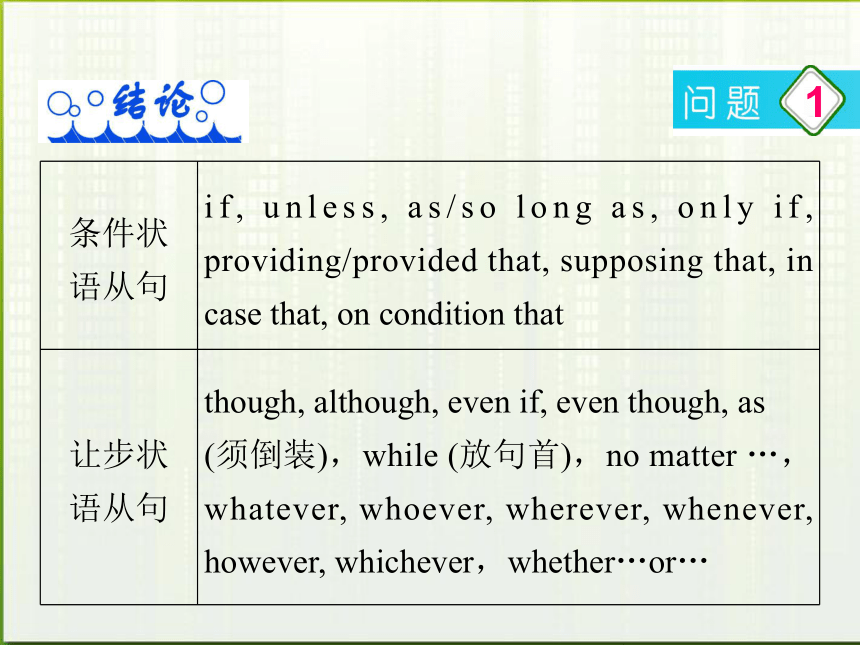
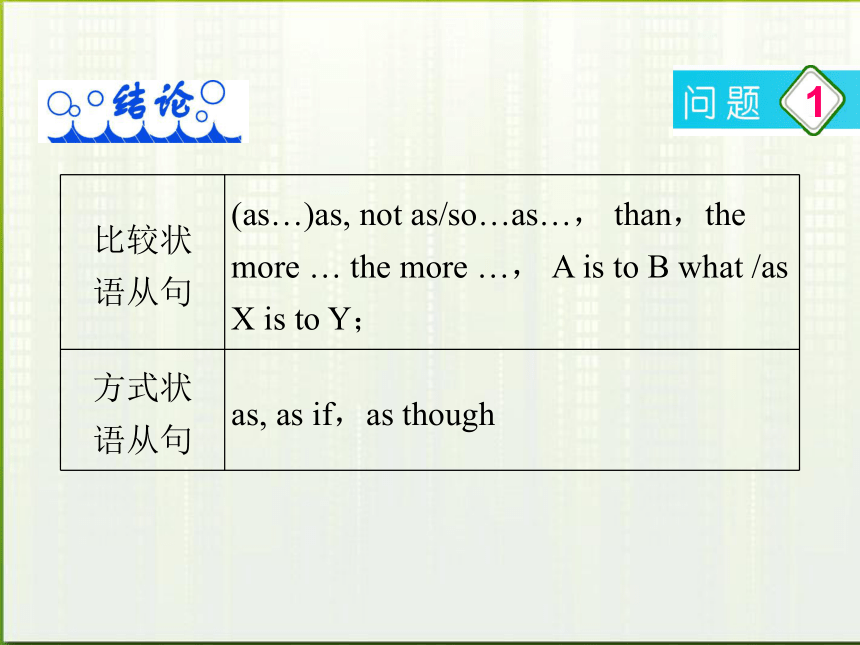
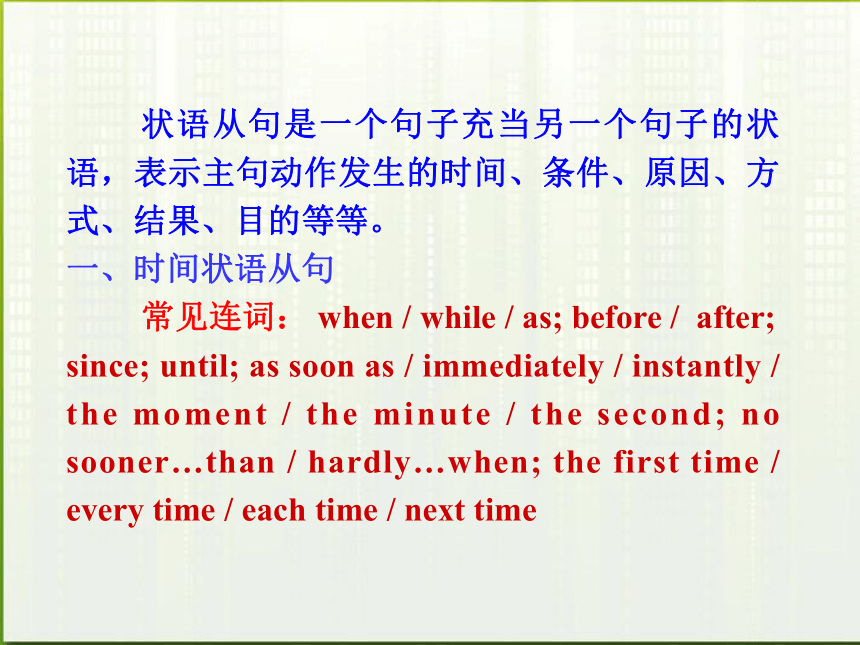
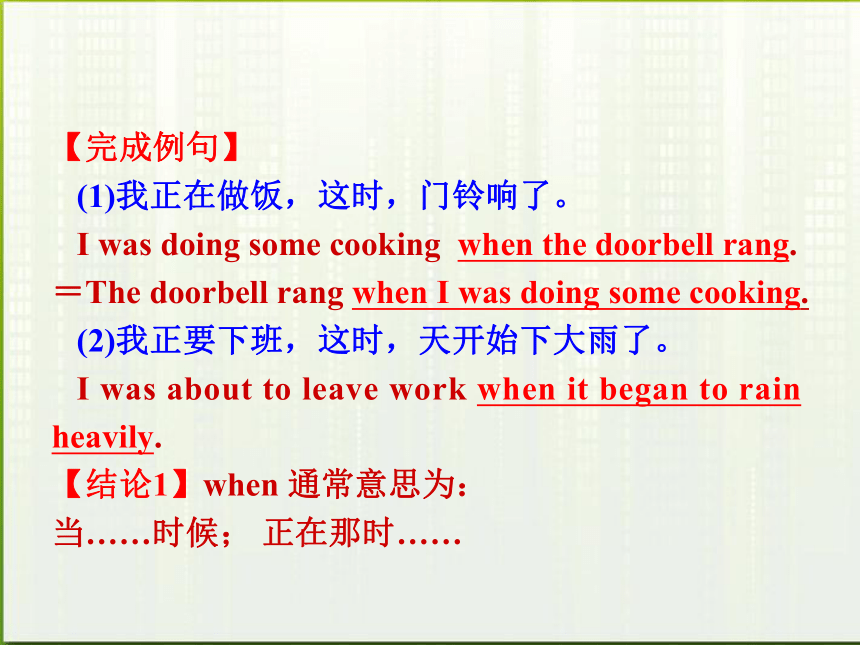
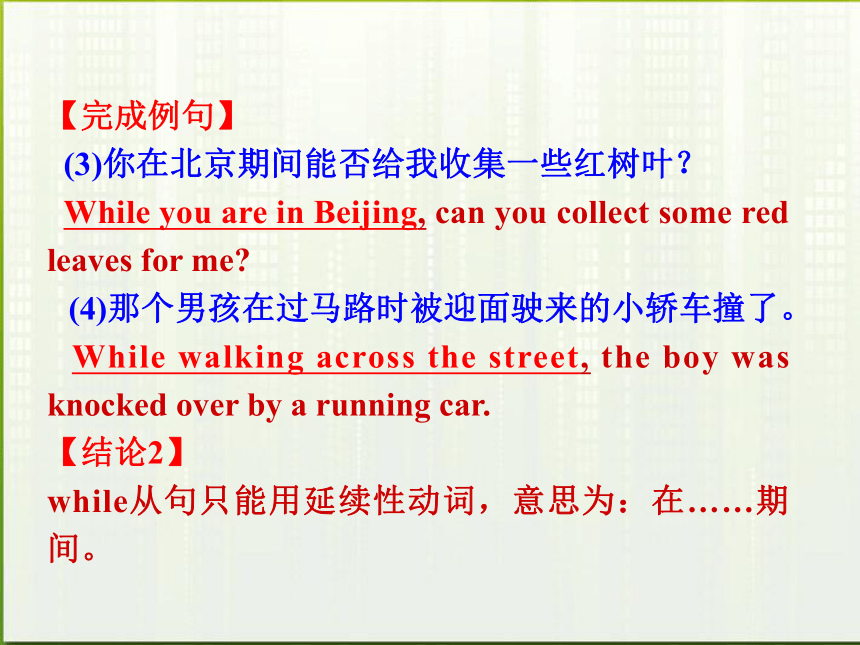
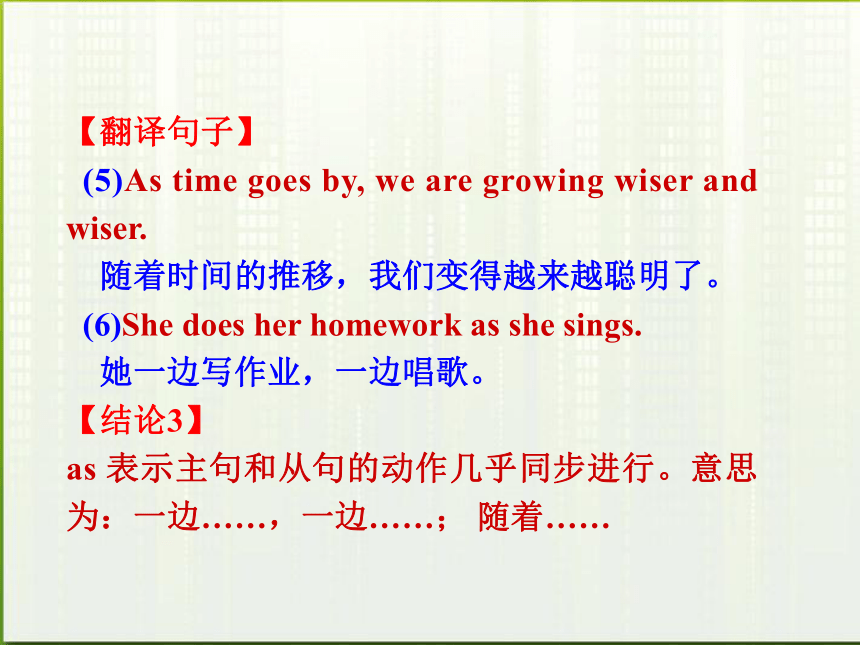
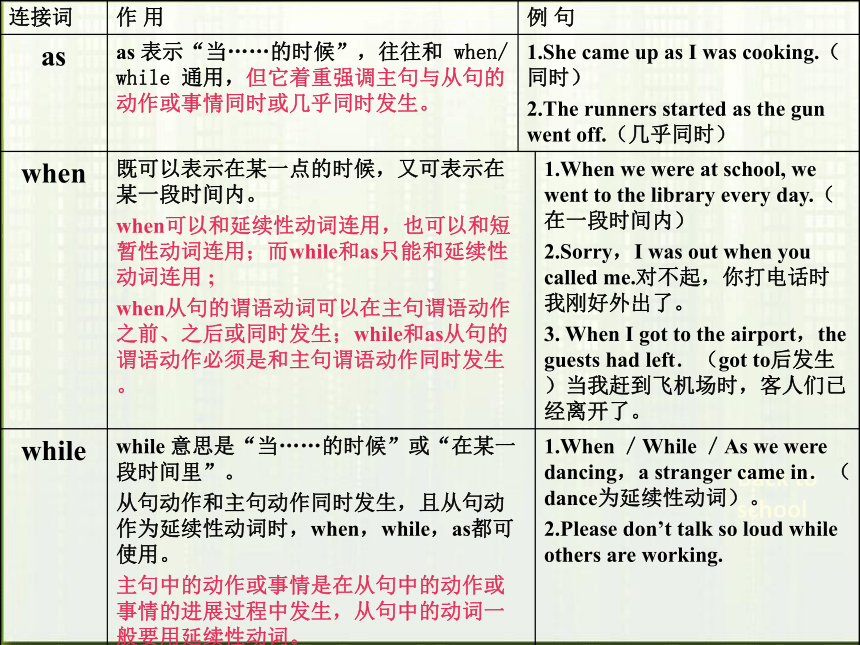
文档简介
(共50张PPT)
条件状语
原因状语
目的状语
地点状语
比较状语
结果状语
时间状语
让步状语
方式状语
状语从句有九种,时地原因条状补,
目比结果方让步,连词引导各不同;
主句通常前面走,连词引导紧随后,
从句若在主前头,主从之间有个逗。
Back to
school
高考中每一分都至关重要
1
时间状
语从句 when, as, while, as soon as, before, after, since, till, until, the minute, the moment, the second, every time,each time, the first time,the instant, immediately, directly,instantly, no sooner … than…, hardly …when…, scarcely … when…
地点状
语从句 where,wherever, anywhere, everywhere
1
原因状
语从句 because, since, as, now that, seeing that, in that, considering that, given that
目的状
语从句 so that, in order that, lest, in case, for fear that,in the hope that, for the purpose that, to the end that
结果状
语从句 so that,so … that…, such … that…, to the degree that, to the extent that
1
条件状
语从句 if, unless, as/so long as, only if, providing/provided that, supposing that, in case that, on condition that
让步状
语从句 though, although, even if, even though, as
(须倒装),while (放句首),no matter …,whatever, whoever, wherever, whenever, however, whichever,whether…or…
1
比较状
语从句 (as…)as, not as/so…as…, than,the more … the more …, A is to B what /as X is to Y;
方式状
语从句 as, as if,as though
状语从句是一个句子充当另一个句子的状语,表示主句动作发生的时间、条件、原因、方式、结果、目的等等。
一、时间状语从句
常见连词: when / while / as; before / after; since; until; as soon as / immediately / instantly / the moment / the minute / the second; no sooner…than / hardly…when; the first time / every time / each time / next time
【完成例句】
(1)我正在做饭,这时,门铃响了。
I was doing some cooking when the doorbell rang.
=The doorbell rang when I was doing some cooking.
(2)我正要下班,这时,天开始下大雨了。
I was about to leave work when it began to rain heavily.
【结论1】when 通常意思为:
当……时候; 正在那时……
【完成例句】
(3)你在北京期间能否给我收集一些红树叶?
While you are in Beijing, can you collect some red leaves for me
(4)那个男孩在过马路时被迎面驶来的小轿车撞了。
While walking across the street, the boy was knocked over by a running car.
【结论2】
while从句只能用延续性动词,意思为:在……期间。
【翻译句子】
(5)As time goes by, we are growing wiser and wiser.
随着时间的推移,我们变得越来越聪明了。
(6)She does her homework as she sings.
她一边写作业,一边唱歌。
【结论3】
as 表示主句和从句的动作几乎同步进行。意思为:一边……,一边……; 随着……
Back to
school
连接词 作 用 例 句
as as 表示“当……的时候”,往往和 when/ while 通用,但它着重强调主句与从句的动作或事情同时或几乎同时发生。 1.She came up as I was cooking.(同时)
2.The runners started as the gun went off.(几乎同时)
when 既可以表示在某一点的时候,又可表示在某一段时间内。
when可以和延续性动词连用,也可以和短暂性动词连用;而while和as只能和延续性动词连用 ;
when从句的谓语动词可以在主句谓语动作之前、之后或同时发生;while和as从句的谓语动作必须是和主句谓语动作同时发生。 1.When we were at school, we went to the library every day.(在一段时间内)
2.Sorry,I was out when you called me.对不起,你打电话时我刚好外出了。
3. When I got to the airport,the guests had left.(got to后发生)当我赶到飞机场时,客人们已经离开了。
while while 意思是“当……的时候”或“在某一段时间里”。
从句动作和主句动作同时发生,且从句动作为延续性动词时,when,while,as都可使用。
主句中的动作或事情是在从句中的动作或事情的进展过程中发生,从句中的动词一般要用延续性动词。 1.When /While /As we were dancing,a stranger came in.(dance为延续性动词)。
2.Please don’t talk so loud while others are working.
【完成例句】
(7)我还没到家就觉得饿了。(在到家之前就觉得饿)
I had felt hungry before I arrived home.
(8)我还没来得及向她道歉,她就离开了办公室。(在我能够说抱歉之前,她就离开了办公室)
She left the office before I could say sorry to her.
(9)还要过很久我们才能毕业。
It will be long before we graduate.
【结论4】 before 在……之前 ;还没来得及……就
【完成例句】
(10)我来上海已经4年了。
It's / has been four years since I came to Shanghai.
【结论5】 since “自从……以来”;是现在完成时的标志。
【注意】从句中延续性动词意义为否定。
例:①我当医生已经3年了。(自从我成为医生以来,时间已经过去3年了。)
It is three years since I became a doctor
②他不当医生已经3年了。
It is three years since he was a doctor.
③我父亲不吸烟已有两年了。
It is two years since my father smoked.
④我父亲吸烟已有两年了。
It is two years since my father began to smoke.
【翻译句子】
(11)我一直睡到闹钟响为止。
I slept until the clock alarmed.
(12)直到爸爸回来我才开始睡觉。
I didn't sleep until my father came back.
【结论6】until ①在肯定句中,表示动作持续“到…为止”;② 在否定句中,常与not连用,表示动作“直到……才开始”。
【翻译句子】
(13)她一到日本就给她妈妈打电话了。
She gave a ring to her mother immediately she landed in Japan.
【结论7】
as soon as / immediately / the moment / the minute / the second引导时间状语从句,意为“一……就”
【完成例句】
(14)她一离开办公室电话就响了。
She left the office the telephone rang.
(15)我们一吃过晚餐就开始修机器了。
We had no sooner had supper than we began to repair the machine.
→ we had supper we began to repair the machine. (倒装句形式)
【结论8】
no sooner…than… / hardly…when… 刚……就……
(注意:主句时态用had done;从句用did )
【例句观察】
Every time I see the film, I can't help recalling my childhood in the countryside.
每当看那部电影,我就忍不住回想起在农村度过的童年。
Call me earlier next time you come to Shanghai.
你下次来上海早点儿给我打电话。
【结论9】
特殊的状语从句连词有:
every time 每当,每次;the first time 第一次……时候,next time 下次……时。
二、条件状语从句
【完成例句】
(16)如果完成了作业,放学后他们就去打篮球。
They will play basketball after school if they finish their work.
(17)除非被邀请,不然我是不会参加会议的。
I will not attend the meeting unless I am invited.
(18)一旦被发现,他就会被逮捕。
Once (he was) found, he would be arrested.
【结论】(1)常见连词:if / unless / once / as (so) long as / on condition that / provided(providing) that… / suppose (supposing) that… / say that… / let's say that…
(2) unless= if…not , 意思是“如果不 / 没有……”
三、原因状语从句
常见连词:because, for, since, as, now that, when
【例句观察】
—Why didn't you come yesterday
—你昨天为什么没来?
—Because my mum was ill.
—因为我妈妈生病了。
It's because my mum was ill yesterday that I didn't come.
我昨天是因为妈妈生病才没来的。
【结论1】①because 表示直接的、必然的原因。回答why问句;
②强调句中只用because表示原因。It is because…that…
【注意】表示补充说明的原因用for,而且不能放在句首。
The day has broken, for the birds are singing now.
天亮了,因为鸟儿在唱歌。
【完成例句】
(19)既然你回答不了这个问题,那我就问问别人吧。
Since you can't answer the question, I'll ask someone else.
【结论2】since 表示众所周知的原因,“既然”,常放在句首。
【翻译句子】
(20)由于天黑了,我们还是下班吧!
As it's dark, we'd better go off work.
【结论3】 as 表示客观原因,“由于”,常放在句首。
5
because语气最强,表示与结果直接相关的原因,可译为“(正/就是)因为”,所以常用于强调句型或回答why引导的问题。
since表示顺承关系,表达说话者认为合乎情理的逻辑推断,可译为“既然……(就……)”,此时用法上相当于now that。
5
as语气比较弱,常译为“由于”,不强调原因时,有时可与because通用。
注意:for也可以表示原因,但它是并列连词,用法上注意两点: 不放句首(语气弱);引出补充说明的原因,不必直接翻译成“因为”。如:Come up to me, for I have something important to tell you.(过来,我有要事对你讲。)
【翻译句子】
(21)既然你生病了,那就躺床上休息休息吧!
Now that you feel sick, you can have a rest in bed.
【结论4】 now that 通常表示用新出现的情况作为原因,“既然”。
【翻译句子】
(22)Why do you want to find a new job when you have a good job already
既然你已经拥有一份好工作了,为什么还要再找新工作呢?
【结论5】 when既然……(有轻微的责备口吻)。
【翻译句子】
(23)His request is unreasonable in that he knows we can't afford it.
他的要求不合理在于他知道我们付不起款。
【结论6】 in that-从句“在于……”。
四、结果状语从句
【例句观察】
She is such a clever girl that we all like her.
She is so clever (a girl) that we all like her.
她是一个如此聪明的女孩以至于我们大家都很喜欢她。
【结论】常见连词:so / such…that… “如此……以至于……”。要牢记下面的几个句型。
①…so +adj. / adv.+that…
②So adj. a / an + n.+that…
③So many / few / much / little(少)+ n. (不可数名词或可数名词复数)+that…
④Such+a / an+adj. + n.+that…
⑤Such+adj. + n. (不可数名词或可数名词复数)+that…
【注意】 that 后面必须是完整的句子,即必须要有完整的主语、谓语、宾语。
五、目的状语从句
【翻译句子】
(24)为了赶上早班车,我们早早地就起床了。
We got up early in order that we could catch the first bus.
【结论1】
so that / in order that +从句(从句用can / could / may / might + 动词原形)为了……
【翻译句子】
(25)以防错过早班车,我们早早地就起床了。
We got up early for fear that / in case that we should miss the first bus.
【结论2】
for fear that / in case that+ 从句(从句可以用虚拟语气即should+动词原形)。
以防万一发生……
目的状语从句和结果状语从句
引导目的状语从句连词有:in case, so that, in order that,
for fear that。 so that引导状语从句只能置于主句之后。In order
that引导状语从句可放主句之前或之后。目的状语从句的谓语常
含有can,could,may,might情态动词。这也是与结果状语从句
的一个区别。引导结果状语从句的连词有:so that,so…that,
such…that.结果状语放在主句之后。
注意:在so…that,such…that结构中一般成分齐全。这也是
与as引导定语从句的区别。在so…as,such…as 这一结构中,
as引导定语从句,在句中做成分。
六、地点状语从句
【翻译句子】
(26)在你有问题的地方做个标记。
Make a mark where you have problems.
这座教堂建在一罗马寺庙的旧址上。
The church was built where there had once been a Roman temple.
【结论3】
where 在……地方= in the place where / in the place in which。
【翻译句子】
(27)无论他在哪,我都会找到他的。
I will find him wherever he may be.
【结论2】
wherever 无论在……地方= no matter where。
七、让步状语从句
【完成例句】
(28)尽管他很富裕,他从不浪费一个子儿。
Although he is rich, he never wastes a coin.
【结论1】
although / though / while (只能位于句首)虽然;尽管。
【翻译句子】
(29)①Old as my father is, he keeps up with his English study.
尽管爸爸年纪大了,他还是坚持学英语。
②Child as he is, he knows something of electricity.
尽管他是个孩子,他懂一点关于电的东西。
(30)尽管他很努力,但是还是失败了。
Hard as he worked, he failed.
(31)尽管汤姆已经尽力了,但还是无法从困境中走出来。
Try as he might, Tom could not get out of the difficulty.
【结论2】as 句型:
①表语(形容词 / 名词)+ as / though + 主语+ 系动词,主句。
【注意】名词前不加任何冠词。
②副词+ as / though+主语+谓语动词,主句。
③动词原形 +as / though + 主语+ might / may, 主句。
根据句子意思选词(though, although, as, while)填空
1. __________ the Internet has so many conveniences, it also has a lot of inconveniences.
2. __________ the actress is beautiful, I don't like her.
3. Child __________ he is, he is the first Chinese to travel across Europe alone by bike.
表达让步含义时,常用从属连词though, although, as, while引导让步状语从句。while强调对比,只能放句首,以引出相对或相反的情况,译为“在……同时,却(有相反的情况) ”,此时可以用though或although替换。though与although大部分情况下可以互相替换,既可放句首,也可放句末。as 引导让步状语从句必须倒装,此时可以用though替换,但不可用although替换。
【翻译句子】
(32)即使明天下雪,我们也要出差。
Even if it snows tomorrow, we shall still go on business.
【结论3】
even if / even though (有一定的假设意味)即使, 纵然。
【翻译句子】
(33)不管那有多难,我们都要尽力完成。
No matter how difficult it might be, we'll try to complete it.
【结论4】
no matter how / what / where / who…, 无论怎么 / 什么 / 哪里 / 谁……
【注意】 no matter 必须和特殊疑问词连用。
【翻译句子】
(34)不管你明天去不去,我们都要去郊游。
Whether you go or not tomorrow, we will go outing.
【结论5】
whether…or…无论是否……
八、方式状语从句
【完成例句】
(35)她英语说得好像她是纽约本地人一样。
She speaks English as though she were a native of New York.
【结论1】
as if / as though + 从句(从句的虚拟语气与wish 后的宾语从句虚拟语气类似)。
【完成例句】
(36)按我刚才告诉你的那样做实验。
Do the experiment as I told you just now.
【结论3】
as 表“正如”。
九、比较状语从句
【例句观察】
She is as tall as her mother.
她和她妈妈一样高。
【结论1】 as… as 和……一样……
She is not as healthy as her sister.
她不如她姐姐健康。
【结论2】 not as / so…as…不如……一样……; 不和……一样……
这个男孩长得比他爸爸高。
The boy is taller than his father.
【结论3】比较级+than 比……更加……
【疑难】比较状语从句通常会结合三个倍数的表达句型进行考查,如:A是B的三倍大有如下三种表达:
(1) A is twice bigger than B.
(2) A is three times as big as B.
(3) A is three times the size of B.
【疑难剖析】
1. A is倍数+adj.的比较级 (larger, heavier, more 等)+than B.
2. A is倍数+as+adj. 的原级( large, heavy / many, much)+ as B
3. A is倍数+the+表比较内容的名词(size, weight, area, width, length 等)of B.
注意:句型1的倍数比句型2、3的倍数少一倍。
条件状语
原因状语
目的状语
地点状语
比较状语
结果状语
时间状语
让步状语
方式状语
状语从句有九种,时地原因条状补,
目比结果方让步,连词引导各不同;
主句通常前面走,连词引导紧随后,
从句若在主前头,主从之间有个逗。
Back to
school
高考中每一分都至关重要
1
时间状
语从句 when, as, while, as soon as, before, after, since, till, until, the minute, the moment, the second, every time,each time, the first time,the instant, immediately, directly,instantly, no sooner … than…, hardly …when…, scarcely … when…
地点状
语从句 where,wherever, anywhere, everywhere
1
原因状
语从句 because, since, as, now that, seeing that, in that, considering that, given that
目的状
语从句 so that, in order that, lest, in case, for fear that,in the hope that, for the purpose that, to the end that
结果状
语从句 so that,so … that…, such … that…, to the degree that, to the extent that
1
条件状
语从句 if, unless, as/so long as, only if, providing/provided that, supposing that, in case that, on condition that
让步状
语从句 though, although, even if, even though, as
(须倒装),while (放句首),no matter …,whatever, whoever, wherever, whenever, however, whichever,whether…or…
1
比较状
语从句 (as…)as, not as/so…as…, than,the more … the more …, A is to B what /as X is to Y;
方式状
语从句 as, as if,as though
状语从句是一个句子充当另一个句子的状语,表示主句动作发生的时间、条件、原因、方式、结果、目的等等。
一、时间状语从句
常见连词: when / while / as; before / after; since; until; as soon as / immediately / instantly / the moment / the minute / the second; no sooner…than / hardly…when; the first time / every time / each time / next time
【完成例句】
(1)我正在做饭,这时,门铃响了。
I was doing some cooking when the doorbell rang.
=The doorbell rang when I was doing some cooking.
(2)我正要下班,这时,天开始下大雨了。
I was about to leave work when it began to rain heavily.
【结论1】when 通常意思为:
当……时候; 正在那时……
【完成例句】
(3)你在北京期间能否给我收集一些红树叶?
While you are in Beijing, can you collect some red leaves for me
(4)那个男孩在过马路时被迎面驶来的小轿车撞了。
While walking across the street, the boy was knocked over by a running car.
【结论2】
while从句只能用延续性动词,意思为:在……期间。
【翻译句子】
(5)As time goes by, we are growing wiser and wiser.
随着时间的推移,我们变得越来越聪明了。
(6)She does her homework as she sings.
她一边写作业,一边唱歌。
【结论3】
as 表示主句和从句的动作几乎同步进行。意思为:一边……,一边……; 随着……
Back to
school
连接词 作 用 例 句
as as 表示“当……的时候”,往往和 when/ while 通用,但它着重强调主句与从句的动作或事情同时或几乎同时发生。 1.She came up as I was cooking.(同时)
2.The runners started as the gun went off.(几乎同时)
when 既可以表示在某一点的时候,又可表示在某一段时间内。
when可以和延续性动词连用,也可以和短暂性动词连用;而while和as只能和延续性动词连用 ;
when从句的谓语动词可以在主句谓语动作之前、之后或同时发生;while和as从句的谓语动作必须是和主句谓语动作同时发生。 1.When we were at school, we went to the library every day.(在一段时间内)
2.Sorry,I was out when you called me.对不起,你打电话时我刚好外出了。
3. When I got to the airport,the guests had left.(got to后发生)当我赶到飞机场时,客人们已经离开了。
while while 意思是“当……的时候”或“在某一段时间里”。
从句动作和主句动作同时发生,且从句动作为延续性动词时,when,while,as都可使用。
主句中的动作或事情是在从句中的动作或事情的进展过程中发生,从句中的动词一般要用延续性动词。 1.When /While /As we were dancing,a stranger came in.(dance为延续性动词)。
2.Please don’t talk so loud while others are working.
【完成例句】
(7)我还没到家就觉得饿了。(在到家之前就觉得饿)
I had felt hungry before I arrived home.
(8)我还没来得及向她道歉,她就离开了办公室。(在我能够说抱歉之前,她就离开了办公室)
She left the office before I could say sorry to her.
(9)还要过很久我们才能毕业。
It will be long before we graduate.
【结论4】 before 在……之前 ;还没来得及……就
【完成例句】
(10)我来上海已经4年了。
It's / has been four years since I came to Shanghai.
【结论5】 since “自从……以来”;是现在完成时的标志。
【注意】从句中延续性动词意义为否定。
例:①我当医生已经3年了。(自从我成为医生以来,时间已经过去3年了。)
It is three years since I became a doctor
②他不当医生已经3年了。
It is three years since he was a doctor.
③我父亲不吸烟已有两年了。
It is two years since my father smoked.
④我父亲吸烟已有两年了。
It is two years since my father began to smoke.
【翻译句子】
(11)我一直睡到闹钟响为止。
I slept until the clock alarmed.
(12)直到爸爸回来我才开始睡觉。
I didn't sleep until my father came back.
【结论6】until ①在肯定句中,表示动作持续“到…为止”;② 在否定句中,常与not连用,表示动作“直到……才开始”。
【翻译句子】
(13)她一到日本就给她妈妈打电话了。
She gave a ring to her mother immediately she landed in Japan.
【结论7】
as soon as / immediately / the moment / the minute / the second引导时间状语从句,意为“一……就”
【完成例句】
(14)她一离开办公室电话就响了。
She left the office the telephone rang.
(15)我们一吃过晚餐就开始修机器了。
We had no sooner had supper than we began to repair the machine.
→ we had supper we began to repair the machine. (倒装句形式)
【结论8】
no sooner…than… / hardly…when… 刚……就……
(注意:主句时态用had done;从句用did )
【例句观察】
Every time I see the film, I can't help recalling my childhood in the countryside.
每当看那部电影,我就忍不住回想起在农村度过的童年。
Call me earlier next time you come to Shanghai.
你下次来上海早点儿给我打电话。
【结论9】
特殊的状语从句连词有:
every time 每当,每次;the first time 第一次……时候,next time 下次……时。
二、条件状语从句
【完成例句】
(16)如果完成了作业,放学后他们就去打篮球。
They will play basketball after school if they finish their work.
(17)除非被邀请,不然我是不会参加会议的。
I will not attend the meeting unless I am invited.
(18)一旦被发现,他就会被逮捕。
Once (he was) found, he would be arrested.
【结论】(1)常见连词:if / unless / once / as (so) long as / on condition that / provided(providing) that… / suppose (supposing) that… / say that… / let's say that…
(2) unless= if…not , 意思是“如果不 / 没有……”
三、原因状语从句
常见连词:because, for, since, as, now that, when
【例句观察】
—Why didn't you come yesterday
—你昨天为什么没来?
—Because my mum was ill.
—因为我妈妈生病了。
It's because my mum was ill yesterday that I didn't come.
我昨天是因为妈妈生病才没来的。
【结论1】①because 表示直接的、必然的原因。回答why问句;
②强调句中只用because表示原因。It is because…that…
【注意】表示补充说明的原因用for,而且不能放在句首。
The day has broken, for the birds are singing now.
天亮了,因为鸟儿在唱歌。
【完成例句】
(19)既然你回答不了这个问题,那我就问问别人吧。
Since you can't answer the question, I'll ask someone else.
【结论2】since 表示众所周知的原因,“既然”,常放在句首。
【翻译句子】
(20)由于天黑了,我们还是下班吧!
As it's dark, we'd better go off work.
【结论3】 as 表示客观原因,“由于”,常放在句首。
5
because语气最强,表示与结果直接相关的原因,可译为“(正/就是)因为”,所以常用于强调句型或回答why引导的问题。
since表示顺承关系,表达说话者认为合乎情理的逻辑推断,可译为“既然……(就……)”,此时用法上相当于now that。
5
as语气比较弱,常译为“由于”,不强调原因时,有时可与because通用。
注意:for也可以表示原因,但它是并列连词,用法上注意两点: 不放句首(语气弱);引出补充说明的原因,不必直接翻译成“因为”。如:Come up to me, for I have something important to tell you.(过来,我有要事对你讲。)
【翻译句子】
(21)既然你生病了,那就躺床上休息休息吧!
Now that you feel sick, you can have a rest in bed.
【结论4】 now that 通常表示用新出现的情况作为原因,“既然”。
【翻译句子】
(22)Why do you want to find a new job when you have a good job already
既然你已经拥有一份好工作了,为什么还要再找新工作呢?
【结论5】 when既然……(有轻微的责备口吻)。
【翻译句子】
(23)His request is unreasonable in that he knows we can't afford it.
他的要求不合理在于他知道我们付不起款。
【结论6】 in that-从句“在于……”。
四、结果状语从句
【例句观察】
She is such a clever girl that we all like her.
She is so clever (a girl) that we all like her.
她是一个如此聪明的女孩以至于我们大家都很喜欢她。
【结论】常见连词:so / such…that… “如此……以至于……”。要牢记下面的几个句型。
①…so +adj. / adv.+that…
②So adj. a / an + n.+that…
③So many / few / much / little(少)+ n. (不可数名词或可数名词复数)+that…
④Such+a / an+adj. + n.+that…
⑤Such+adj. + n. (不可数名词或可数名词复数)+that…
【注意】 that 后面必须是完整的句子,即必须要有完整的主语、谓语、宾语。
五、目的状语从句
【翻译句子】
(24)为了赶上早班车,我们早早地就起床了。
We got up early in order that we could catch the first bus.
【结论1】
so that / in order that +从句(从句用can / could / may / might + 动词原形)为了……
【翻译句子】
(25)以防错过早班车,我们早早地就起床了。
We got up early for fear that / in case that we should miss the first bus.
【结论2】
for fear that / in case that+ 从句(从句可以用虚拟语气即should+动词原形)。
以防万一发生……
目的状语从句和结果状语从句
引导目的状语从句连词有:in case, so that, in order that,
for fear that。 so that引导状语从句只能置于主句之后。In order
that引导状语从句可放主句之前或之后。目的状语从句的谓语常
含有can,could,may,might情态动词。这也是与结果状语从句
的一个区别。引导结果状语从句的连词有:so that,so…that,
such…that.结果状语放在主句之后。
注意:在so…that,such…that结构中一般成分齐全。这也是
与as引导定语从句的区别。在so…as,such…as 这一结构中,
as引导定语从句,在句中做成分。
六、地点状语从句
【翻译句子】
(26)在你有问题的地方做个标记。
Make a mark where you have problems.
这座教堂建在一罗马寺庙的旧址上。
The church was built where there had once been a Roman temple.
【结论3】
where 在……地方= in the place where / in the place in which。
【翻译句子】
(27)无论他在哪,我都会找到他的。
I will find him wherever he may be.
【结论2】
wherever 无论在……地方= no matter where。
七、让步状语从句
【完成例句】
(28)尽管他很富裕,他从不浪费一个子儿。
Although he is rich, he never wastes a coin.
【结论1】
although / though / while (只能位于句首)虽然;尽管。
【翻译句子】
(29)①Old as my father is, he keeps up with his English study.
尽管爸爸年纪大了,他还是坚持学英语。
②Child as he is, he knows something of electricity.
尽管他是个孩子,他懂一点关于电的东西。
(30)尽管他很努力,但是还是失败了。
Hard as he worked, he failed.
(31)尽管汤姆已经尽力了,但还是无法从困境中走出来。
Try as he might, Tom could not get out of the difficulty.
【结论2】as 句型:
①表语(形容词 / 名词)+ as / though + 主语+ 系动词,主句。
【注意】名词前不加任何冠词。
②副词+ as / though+主语+谓语动词,主句。
③动词原形 +as / though + 主语+ might / may, 主句。
根据句子意思选词(though, although, as, while)填空
1. __________ the Internet has so many conveniences, it also has a lot of inconveniences.
2. __________ the actress is beautiful, I don't like her.
3. Child __________ he is, he is the first Chinese to travel across Europe alone by bike.
表达让步含义时,常用从属连词though, although, as, while引导让步状语从句。while强调对比,只能放句首,以引出相对或相反的情况,译为“在……同时,却(有相反的情况) ”,此时可以用though或although替换。though与although大部分情况下可以互相替换,既可放句首,也可放句末。as 引导让步状语从句必须倒装,此时可以用though替换,但不可用although替换。
【翻译句子】
(32)即使明天下雪,我们也要出差。
Even if it snows tomorrow, we shall still go on business.
【结论3】
even if / even though (有一定的假设意味)即使, 纵然。
【翻译句子】
(33)不管那有多难,我们都要尽力完成。
No matter how difficult it might be, we'll try to complete it.
【结论4】
no matter how / what / where / who…, 无论怎么 / 什么 / 哪里 / 谁……
【注意】 no matter 必须和特殊疑问词连用。
【翻译句子】
(34)不管你明天去不去,我们都要去郊游。
Whether you go or not tomorrow, we will go outing.
【结论5】
whether…or…无论是否……
八、方式状语从句
【完成例句】
(35)她英语说得好像她是纽约本地人一样。
She speaks English as though she were a native of New York.
【结论1】
as if / as though + 从句(从句的虚拟语气与wish 后的宾语从句虚拟语气类似)。
【完成例句】
(36)按我刚才告诉你的那样做实验。
Do the experiment as I told you just now.
【结论3】
as 表“正如”。
九、比较状语从句
【例句观察】
She is as tall as her mother.
她和她妈妈一样高。
【结论1】 as… as 和……一样……
She is not as healthy as her sister.
她不如她姐姐健康。
【结论2】 not as / so…as…不如……一样……; 不和……一样……
这个男孩长得比他爸爸高。
The boy is taller than his father.
【结论3】比较级+than 比……更加……
【疑难】比较状语从句通常会结合三个倍数的表达句型进行考查,如:A是B的三倍大有如下三种表达:
(1) A is twice bigger than B.
(2) A is three times as big as B.
(3) A is three times the size of B.
【疑难剖析】
1. A is倍数+adj.的比较级 (larger, heavier, more 等)+than B.
2. A is倍数+as+adj. 的原级( large, heavy / many, much)+ as B
3. A is倍数+the+表比较内容的名词(size, weight, area, width, length 等)of B.
注意:句型1的倍数比句型2、3的倍数少一倍。
